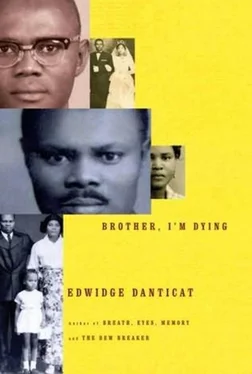I’ve since discovered that children who spend their childhood without their parents love to hear stories like this, which they can embellish and expand as they wish. These types of anecdotes momentarily put our minds at ease, assuring us that we were indeed loved by the parent who left. Unfortunately, I wasn’t told many stories like that. What I did often hear about was the future, an undetermined time when my father would send for my mother, Bob and me.
Once my father was gone, Uncle Joseph would stop by every now and then to see us after work, and of course my mother, Bob and I continued to attend services at his church. Fiercely independent and too proud to seek his involvement or ask for loans when the monthly allowance my father sent her ran out, my mother continued my father’s work, sewing school uniforms and flags. One Sunday morning when she had no money at all, my mother dropped us on my uncle’s lap after church so we could have a proper Sunday meal with him and Tante Denise.
“One day this will stop,” my mother told him. Then she ran home, crying.
Two years after my father left, when I was four and Bob was two, the one-month tourist visa that my mother had applied and been rejected for several times was finally approved. When it came time for her to leave, we drove with her-Tante Denise, Uncle Joseph and Bob and me-to the airport. Bob sat on my mother’s lap in the backseat and I sat next to her with my head leaning against her arm.
In the airport, at the gate, my mother’s eyes welled with tears as she handed Bob over to Tante Denise, who quickly removed her gloves to receive him in her arms. Back then Tante Denise rarely removed her gloves in public, so the very careful gesture, her removing her gloves and patting her wig slightly with her well-manicured fingers, seemed to me to indicate that something big was going to happen. I didn’t know exactly when the word had come that my mother could leave, but I should have suspected something. All that week, my mother had been sewing me dresses: long ones with large bows and elaborate collars, short ones in carnation prints and others with pink lace ruffles. By the end of the week I had ten dresses in total, most of them too big for me, so that, I realized now, I could wear them in the future, while she was gone. She had even made me a matching version of the plain white cotton dress that we were both wearing at the airport, a dress that resembled the kind of modest frock one might wear to be immersed in water at an adult baptism at my uncle Joseph’s church. It was all making sense. She had also bought Bob three brand-new suits, two of them with short pants and one large one with long pants. She had given away the light blue unopened sheet set she kept under her bed for a sick day to Marie Micheline and her ceramic pitchers to Tante Denise. But she hadn’t moved our things from our house. Our beds? Our clothes? And a treasured birthday gift from my uncle, a copy of Ludwig Bemelman’s Madeleine. These things, were they even now being moved to Uncle Joseph and Tante Denise’s house?
When it was time for my mother to board the plane, I wrapped my arms around her stockinged legs to keep her feet from moving. She leaned down and unballed my fists as Uncle Joseph tugged at the back of my dress, grabbing both my hands, peeling me off of her.
“Kalm,” he said. “Calm yourself.” And for a moment his voice, deep, firm, did pacify me. After all, it seemed that he and Tante Denise would now be in charge of us. They would be our parents. But what if our mother went away and never came back? Just like our father.
Panicked, I leaped out of Uncle Joseph’s arms and ran right to my mother, pressing my face against her legs. I pushed him back as he tried to grab me again.
Having run from Tante Denise, Bob was also on the floor pounding his tiny fists against the cold tiles, bawling. His face was covered with some phlegm he had spit up. Answering a final boarding call, my mother hurried away, her tear-soaked face buried in her hands. She couldn’t bear to look back.
My mother was right about my plane ride to Miami that July 2004. It was going to be the most lonesome of my life.
After checking in and clearing security, I called my husband from the airport gate.
“I can’t wait to see you both ,” he said in his unwaveringly cheerful voice.
Soon after I hung up, I learned that the flight would be delayed five hours. We wouldn’t leave until eight p.m. The fluttering in my stomach, no longer mysterious, continued. It was a presence now, one to which I could assign all kinds of deeds and traits, a little baby sleeping, waking, doing cartwheels.
At that stage of the pregnancy, the baby was most likely an inch long, a tiny tadpole with a yet undeveloped heart and brain and only micro bumps for arms and legs, but he/she was already the only person, besides my dying father, who was constantly on my mind.
I called my father’s cell phone to tell him I was going to be delayed. Perhaps if he wasn’t too far from the airport, he could come back and get me.
He didn’t answer. Was something wrong? Wrong was now the norm. Did something even worse happen? I would ask myself that question each time I called him and the phone wasn’t picked up. Was he in a car crash? Was he dead?
I kept calling the house until my mother answered.
“He just dropped me off,” she said, dragging her words.
“He’s not answering the phone,” I said.
“You know him. He probably forgot to charge it.”
My father was at the car service office when he finally picked up his cell phone.
“I thought you’d left,” he said.
There were times when he was relaxed and well rested that he didn’t sound ill at all. As he grew sicker, I’d have to look for hints in his tone to judge for myself when he wasn’t doing well.
“Should I come and get you?” he asked.
Not wanting him to overextend himself, I said, “I should probably stay in case the plane leaves sooner than expected. I just wanted you to know.”
“Call me again before you take off,” he said.
I had several hours left, so I speed-walked the terminals while I called my brothers to tell them the news. Bob had just left my parents’ house, where he’d been visiting with my mother.
“Mom doesn’t like the way you told them,” he said, confirming my suspicion.
I called my mother again. After all, I reasoned, what if the plane crashed when I finally got on and I lost forever my chance to tell her I was sorry?
“Manman, eskize m, I’m sorry.” Perhaps it was the combined thrill and sorrow stirred up by both the pregnancy and my father’s illness, but I wanted her never to be angry with me again.
Next, I called my brother Karl at work.
“Welcome to my world,” he said. I could almost see him grinning as he shuffled some papers back and forth on his desk. “You’ll never be on time for anything again. And sleeping in? Forget it.”
Those caveats were now a link between us. Oldest sister and baby brother, we could now discuss not just our parents but our kids.
When I called my brother Kelly, he remembered a conversation we’d had when I was a senior in high school, when I’d declared that my greatest dream in life was to be a childless spinster so I could have total freedom to write my books.
“Now the married spinster is pregnant.” He laughed.
Announcing my pregnancy kept me from talking about my father, at least for a while. Walking through the terminal, I called a few friends, people I didn’t want to wait the safe twelve weeks to tell. However I told only two of them the flip side of my news, that my father was dying. One, who knew my father well, became angry with me for accepting the doctor’s prognosis so easily.
Читать дальше












